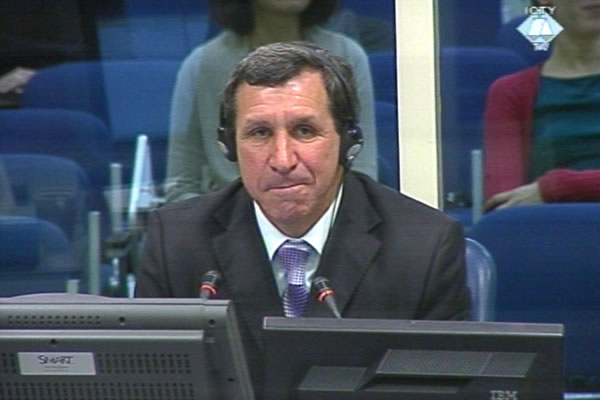Home
DEMURENKO DENIES HE ENJOYED SPECIAL TREATMENT FROM VRS
The prosecution continued cross-examining Colonel Andrey Demurenko, insisting that the fact he was Russian affected his actions at the time when he served as the chief of staff in the UNPROFOR Sector Sarajevo. It also affected his investigation of the Markale incident, the prosecution argued. Demurenko did not deny ‘Serbs are a nation dear to the Russians’, but dismissed claims he and other members of the Russian contingent enjoyed special treatment from the Serb forces
 Andrej Demurenko, defence witness of Radovan Karadzic
Andrej Demurenko, defence witness of Radovan Karadzic The prosecution continued cross-examining Colonel Andrey Demurenko, insisting that the fact he was Russian affected his actions at the time when he served as the chief of staff in the UNPROFOR Sector Sarajevo. It also affected his private investigation of the Markale incident on 28 August 1995, in which 43 people lost their lives and 75 were injured.
Prosecutor Alan Tieger brought up Demurenko’s interview to the Moscow Pravda in 1996 in which he says ‘Serbs are a nation dear to the Russians’. The witness said ‘that’s just the way it is’, adding that he didn’t want to deny a historical fact. He disagreed with the prosecutor’s claim that the closeness caused him to have an ‘emotional reaction’ to UNPROFOR’s communiqué that the shell that hit Markale on 28 August 1995 was fired from Serb positions.
Demurenko said he ‘knew perfectly well what demands are set by military science and the theory of impartiality’, noting that he tried ‘in hundreds of cases’ to determine the truth about the suffering of the Muslims in Sarajevo. As he explained, he found it strange that his colleagues would smile mirthlessly and say, ‘you’re Russian, why are you defending the Muslims’. ‘I’d tell them I was not there to be Russian, but a peace-keeper and I don’t want to see anyone’s blood spilled’.
Arguing that he and other members of the Russian Battalion enjoyed special treatment from the VRS compared to the other UN peace-keepers, the prosecutor recalled that in May and June 1995, the VRS did not take a single Russian hostage. At that time, as the indictment alleges, the VRS captured and used as hostages over 200 UN members in order to force NATO to refrain from air strikes on VRS military targets.
In the statement Demurenko gave Karadzic’s defense, he claimed that in the course of his tour of duty in Sarajevo he never met with the Bosnian Serb military and civilian leaders. However, as the witness was being proofed for his testimony by the defense, he ‘heard a rumor’ that the prosecution had documents showing that he did have such contacts, today he said he did meet with the Bosnian Serb leaders. These contacts were not ‘private’ but ‘official’, as he explained; they met at various venues to discuss the compliance with the agreements.
The prosecutor then confronted the witness with Ratko Mladic’s notes which state that on 21 October 1995, Demurenko met with Mladic, Tolimir and two other VRS officers, and that they discussed the possibility that Russian special forces might be dispatched and arms procured through ‘the Russian contingent’ and other routes. Demurenko claimed he was just a member of the Russian delegation; on that occasion, ‘there was simply an exchange of information about the difficulties the parties had encountered’.
The prosecutor wanted to know why the witness described Mladic in his interview in the Russian Pravda as ‘an extremely talented commander’. Demurenko replied he had good reason to do so, given that the former VRS Main Staff commander had degrees from three military academies, had won a medal and ‘made decisions that did not result in mass blood-shed’.
Linked Reports
- Case : Karadzic
- 2012-10-16 COLONEL DEMURENKO'S PRIVATE INVESTIGATION OF MARKALE MASSACRE
- 2012-10-16 KARADZIC SEEKS PRAISE, NOT CONDEMNATION
- 2012-10-12 KARADZIC ASKS FOR MORE TIME
- 2012-10-18 DENYING SNIPER AND ARTILLERY TERROR IN SARAJEVO
- 2012-10-22 KARADZIC'S WITNESS: 'DON'T ASK ME ABOUT ARTILLERY'
- 2012-10-22 TV NEWS AS SOURCE FOR VRS INTELLIGENCE
